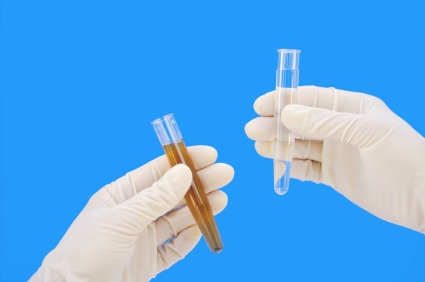The importance of getting your water tested
 Testing the quality of your water regularly is an essential component to ensuring the safety and reliability of your drinking and household water. Even if you have a suspicion that your water should be treated, until you properly assess the specific problems and types of contamination present in your water source, the right treatment option cannot be accurately evaluated. Water testing is the only way to be certain that your water is safe to drink or if problems are present, and is the first step to determine what can be done to treat your water. We carry a range of water treatment options , and also offer water testing in London and Southwestern Ontario. Get in touch with us today to learn more.
Testing the quality of your water regularly is an essential component to ensuring the safety and reliability of your drinking and household water. Even if you have a suspicion that your water should be treated, until you properly assess the specific problems and types of contamination present in your water source, the right treatment option cannot be accurately evaluated. Water testing is the only way to be certain that your water is safe to drink or if problems are present, and is the first step to determine what can be done to treat your water. We carry a range of water treatment options , and also offer water testing in London and Southwestern Ontario. Get in touch with us today to learn more.
Testing the quality of your water regularly is an essential component to ensuring the safety and reliability of your drinking and household water. Even if you have a suspicion that your water should be treated, until you properly assess the specific problems and types of contamination present in your water source, the right treatment option cannot be accurately evaluated. Water testing is the only way to be certain that your water is safe to drink or if problems are present, and is the first step to determine what can be done to treat your water. We carry a range of water treatment options , and also offer water testing in London and Southwestern Ontario. Get in touch with us today to learn more.
Especially when it comes to well water, harmful bacteria, viruses and parasites can be present, and can only be determined through a laboratory test. These invisible contaminants can sometimes cause severe illness and require medical attention, although other health problems caused by untreated water can take years to develop. Regular water testing and subsequent treatment, if necessary, can ensure that your water is safe to drink and use for household purposes.
Water quality can change, sometimes suddenly, so once you begin treating your water, regular testing can help track contamination levels over time as well as ensure that the treatment options you select are working effectively. It is important that private well water should receive testing at least once a year, and if your well is shallow or your drinking water is provided by more surface water sources, it is essential to have your water tested seasonally to closely monitor potential contamination.
Especially if your water is being treated, testing occurs both at the source of the water and directly from the tap to monitor whether 1) the contamination levels of the water source have changed and 2) if the form of water treatment is working properly and effectively.
Getting your water tested is easy and effective, and it often does not take a long time to receive laboratory results. There are a number of different tests that can be conducted, and your local municipality will often offer some form of basic water potability test which can evaluate levels of nitrates, pH, chloride, sulphate, coliform bacteria, fluoride, manganese, hardness, sodium and total dissolved solids.
Nitrates are often present in groundwater, and is an important contaminant to test for especially if your household includes a baby under six months, as high nitrate concentrations can inhibit the ability of the blood to transport oxygen. Too much fluoride can result in brittle teeth, and is a micro-nutrient that many people monitor through water testing.
The presence of coliform bacteria is especially important to test for, as these unwanted microorganisms can sometimes cause serious human health implications.
An excessive presence of undesirable ions, including sodium, chloride, iron, sulphate, and manganese may result in your water tasting or smelling unpleasant. Sulfates can lead to gastrointestinal problems or irritation. Once a test confirms precisely which ion is causing the bad taste and/or smell, treatments options are easy to implement and monitor to rid your water of these ions.
You may wish to have your drinking water undergo more stringent testing than simply a basic water potability test in order to ensure that your water is completely free of all contaminants, especially if you suspect that a particular contaminant (such as uranium, selenium or arsenic) may be present in your water.

